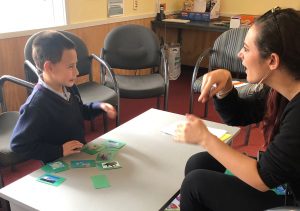WelCom September 2019:
The International Day of Sign Languages is celebrated across the world on 23 September every year along with International Week of the Deaf. New Zealand Sign Language or NZSL became an official language in New Zealand in 2006 alongside English and Te Reo Māori. St Theresa’s Catholic School in Plimmerton, north of Wellington, has gained national recognition for its integrated NZSL programme. WelCom spoke with principal Donna McDonald about the school’s adoption of NZSL.
How and why has learning NZSL developed at your school?
In 2016 we had a new entrant student start at St Theresa’s who was profoundly deaf and had limited ability to communicate. During term 4 of 2015, staff were given some professional development on NZSL and this helped with the transition process. We adopted a whole-school approach to learning NZSL and while the major focus was on the new entrant and junior school, as that was where the most support was needed, we also knew it was important to get everyone involved.
How are students and families involved?
All students learn some sign at school; we have a sign language club that students can attend. We also have had teachers attend night classes and have continued their language acquisition through events and courses run by van Asch [Deaf Education Centre]. Hearing children can attend NZSL immersion days along with deaf students and teachers and support staff, that are run through van Asch. These sessions are beneficial to both the students and the school as they bring their new learning back to the community.

Andre in school, with his NZSL tutor from van Asch Deaf Education Centre, learning category descriptions. Photo: Supplied
What other values does learning NZSL give your students?
Compassion, empathy, resilience, communication skills and another official language.
Across the school and with our community we always promote the importance of NZSL as one of our country’s three official languages. All classes use some NZSL and staff are able to communicate at a basic level. We include NZSL in prayers, greetings and in as much of our day as possible. We have also integrated NZSL into our school production with the whole school learning to sign the main songs, scripture drama where a group presented a drama using NZSL and in Liturgy and Mass where we have the parts of the Mass interpreted in NZSL. This year our school-wide professional development focus is on Te Reo Māori and we have begun to learn the Te Reo, English and NZSL for many of the common phrases we use with the children. Our goal is for all of our community to become tri-lingual.
What recognition has St Theresa’s School achieved through NZSL as part of your curriculum?
We received the NZSL in schools award in 2016; and we have had several stories about the school printed in the Gazette, Stuff, MoE etc. We were part of the writing, illustration and publication of a reading resource called Joe’s News, which is a Level 14 Ready to Read [a story about a Deaf boy about to start school and the teacher arranging for the children to learn sign language]. We have had a short documentary made by van Asch about our school journey, called The Making of an NZSL Friendly School. We have many visitors from schools around the country and are always happy to share our practice and our journey.
What are the overall benefits?
Learning NZSL has influenced the whole community in a positive way. We are all learning together and we support one another at whatever stage we are at. All new staff, families and students very quickly see this is just another part of who we are. NZSL has become more meaningful to us as we see it being used in everyday real context. It’s a great feeling to be able to increase your interaction with the Deaf community and this has helped us to grow stronger relationships. We are very thankful we have been given this opportunity through the enrolment of one student.